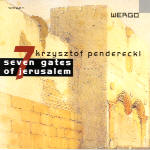This very major release offers a large scale choral symphony by one of today’s leading composers who, in recent times, has been accused of going soft with his return to tonality. The informative program notes state that Penderecki based the work largely on the number seven (hence, the Seven Gates of Jerusalem), and that it’s symbolic for the resurrection of the Jewish people after the Holocaust as well. This last point is made poignantly obvious after the fifth movement Scherzo, the longest and most dynamic section of the work. At that juncture, the segue into the sixth movement is dominated by an amplified male speaker who recites from Ezekiel 37 in Hebrew – an allegory for the resurrection made plain through the revivification of human bones drying out in a desert field. This recitation is clearly the emotional climax of the symphony, and is tremdously evocative and quite frightening–especially since the voice of God is also represented by an atonal, muted bass trumpet obbligato.
The wild “Scherzo – Trio – Scherzo” fifth movement is by far the most fun to listen to. It’s here that Penderecki unleashes a large battery of percussion, including a complete set of tuned Tubaphones–long plastic tubes that are sounded by striking their top openings with something that looks like a large ping-pong paddle. Rhythmic figures from the strings and brass are reminiscent of Lutoslawski’s Concerto for Orchestra at its punchiest moments, but it is Shostakovich that the overall tone of this movement most readily recalls. Much like Carl Orff’s wheel of fortune that both starts and finishes his justly famous Carmina Burana, the first and seventh movements are comprised of a chorale statement that is both declamatory and chant like in nature, accompanied by heavy brass and splashy gongs.
The slightly more subdued second, third, and forth movements take their biblical text from the Psalms – praising the glories of the city of Jerusalem (as do the first, fifth, and seventh movments), and serving as a vehicle for the various vocal soloists to display their wares. The exaltation is then continued in the seventh movement with passages from Jeremiah, Daniel, Isaiah, as well as more Psalms–all sung in quick succession before the return of the opening choral statement. Fans of avant-garde modern music will, no doubt, accuse Penderecki of having “sold out” the cause. However, these same people would be greatly mistaken in imagining this symphony to be overly simplistic in its construction. While Penderecki may have abandoned his trademark sliding and slithering from one note to the next, neither has he strayed too far from it either. Instead, he now relies heavily on chromatic scales (mostly descending in this work) to quickly move from one tonal center to another.
All in all, this is an extremely well crafted, well-designed one-hour vocal, choral, and orchestral extravaganza. Perhaps someday, there’ll be a studio recording that captures just a tad more of the work’s overall dynamic range. However, it would also be difficult to imagine any recording getting the balances better than this “one off” live one. Although none of the five vocalists involved is a household name, all of them sing with the utmost professionalism and dedication to the piece. No doubt, much credit must also be given to the powerful and effective conducting of Kazimierz Kord–presumably under the supervision of the composer himself. This is an important and highly recommended release. No fan of Carmina Burana, Bernstein’s Chichester Psalms, Britten’s War Requiem, or even Penderecki’s earlier work should allow themselves to miss it.
































